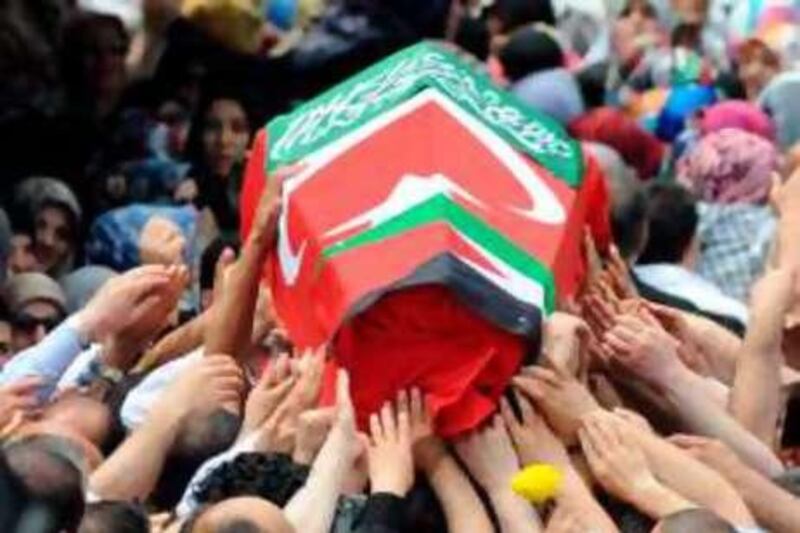ISTANBUL // Turkish activists will organise more and possibly bigger flotillas with aid supplies for Gaza despite the deadly Israeli raid on six ships this week, the aid organisation behind the Gaza convoy said yesterday. The announcement came as Turkish authorities determined that eight people killed during the raid were Turkish citizens, while one was a US citizen of Turkish origin. All of them had been shot dead.
Abdullah Gul, Turkey's president, said the incident would continue to burden relations between Turkey and Israel in the future. "We will never forget this; Turkey will not forgive this," he told reporters. "We will continue until the embargo is lifted," Bulent Yildirim, chairman of the Foundation for Human Rights and Freedom and Humanitarian Relief, or IHH, told reporters at the airport of Istanbul after his return from Israel. Mr Yildirim, who was among 466 activists detained by Israel before being released late on Wednesday, was referring to the three-year-old blockade of Gaza by Israel. "Either the embargo is lifted, or we will send bigger flotillas and vehicle convoys simultaneously from Egypt and from the sea," Mr Yildirim said.
Yavuz Dede, the IHH's deputy chairman, said Israel should expect much larger ship convoys in the future. "The number of ships can rise to 50," he said in an interview at the IHH's headquarters in Fatih, a religious district on Istanbul. "We are getting support from all over the world." The Israeli action against the flotilla triggered global condemnation, but Israel said its soldiers were acting in self-defence after being attacked by the activists on the main ship of the convoy, the Turkish-registered Mavi Marmara, which had Mr Yildirim and several hundred other Turkish citizens on board.
In Istanbul, the activists were greeted by a high-ranking government delegation and received a heroes' welcome by several thousand supporters waving Turkish and Palestinian flags. "Turkey is proud of you," the crowd shouted. Several dozen of injured were treated in hospitals in Istanbul and Ankara, where doctors said most had been wounded by firearms. Forensic experts in Istanbul performed autopsies on the bodies of the nine people killed in the raid and concluded in a preliminary report that all victims had been killed by firearms and one was shot from close range, media reports said. Funeral services for the victims were held at Fatih mosque close to the IHH's headquarters. At least some of the victims were members of the foundation.
A state prosecutor in Istanbul opened a criminal investigation and interviewed returnees from the aid ships, the Turkish news channel NTV reported. Bulent Arinc, Turkey's deputy prime minister, had announced earlier that the judiciary would look into possible legal actions against Israeli officials. Mr Yildirim accused the Israeli soldiers of killing civilians and of mistreating the activists after the raid was over. "We do not know whether they killed some people and threw them overboard," he said. He confirmed that the activists had taken the weapons of some Israeli soldiers during the raid but insisted that they did not use them. "We said that if we do not use them, Israel will be in an even more difficult position" after the event, he said.
The IHH said yesterday three people registered as passengers of the flotilla were still unaccounted for. "I want my dad," one young man, who had come to Istanbul's airport to search for his missing father, said on Turkish television. It was not immediately clear if some of the missing were among the dead. Oguz Celikkol, the Turkish ambassador to Israel who was recalled by his government, told reporters after his arrival in Ankara that two of the critically injured activists were still being treated in Israel.
At the IHH headquarters in Fatih, officials received a steady stream of relatives and friends of passengers looking for information about their loved ones and of people eager to donate money to the organisation. "We are in mourning, but our morale is in place," Mr Dede said. Many IHH officials and visitors wore Palestinian-style shawls in a sign of solidarity. The street outside the IHH headquarters was festooned with Turkish and Palestinian flags. "Our course is Palestine, our load is humanitarian aid," says the slogan of an IHH poster seen all around Istanbul.
Mr Dede said the date for the departure of a new flotilla had not been set yet, but that there were "many demands for new ships" by other groups. At present, the IHH was not working on a new flotilla itself. As he spoke, a Turkish family of five from Germany arrived to donate money for Gaza. "We felt bad and paralysed because we could not do anything," the woman said about the moment she saw the television footage of the Israeli raid. She declined to be named.
Mr Dede said the IHH, which provided three of the six ships of the flotilla captured by the Israelis, had paid for the generators, building materials and other aid supplies with money donated from Turks in Turkey and abroad. Turkish authorities had checked all the goods before the ships set sail for Gaza, he said. "In order to bring weapons on board, you would have to have the permission of the Turkish government. Is that possible?" Mr Dede said in response to claims by Israeli officials that the aid convoy may have carried arms for anti-Israeli militants in Gaza.
Checks for possible weapons on the ships "are just as strict as those at an airport", Mr Dede said. tseibert@thenational.ae






